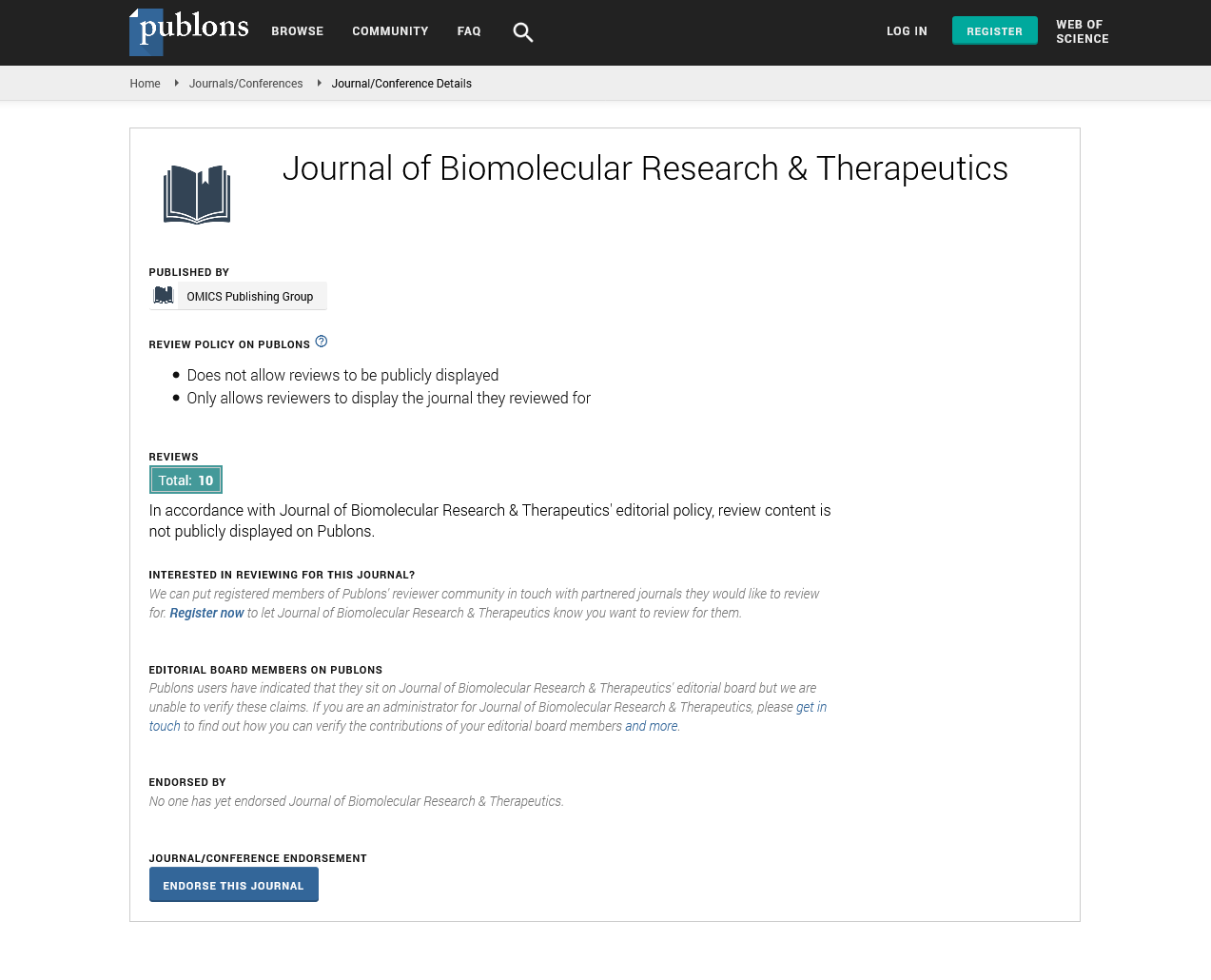Indexed In
- Open J Gate
- Genamics JournalSeek
- ResearchBible
- Electronic Journals Library
- RefSeek
- Hamdard University
- EBSCO A-Z
- OCLC- WorldCat
- SWB online catalog
- Virtual Library of Biology (vifabio)
- Publons
- Euro Pub
- Google Scholar
Useful Links
Share This Page
Journal Flyer

Open Access Journals
- Agri and Aquaculture
- Biochemistry
- Bioinformatics & Systems Biology
- Business & Management
- Chemistry
- Clinical Sciences
- Engineering
- Food & Nutrition
- General Science
- Genetics & Molecular Biology
- Immunology & Microbiology
- Medical Sciences
- Neuroscience & Psychology
- Nursing & Health Care
- Pharmaceutical Sciences
Perspective - (2025) Volume 14, Issue 3
Role of Artificial Intelligence in Precision Medicine
Lukas Weber*Received: 29-May-2025, Manuscript No. BOM-25-29604; Editor assigned: 31-May-2025, Pre QC No. BOM-25-29604; Reviewed: 14-Jun-2025, QC No. BOM-25-29604; Revised: 20-Jun-2025, Manuscript No. BOM-25-29604; Published: 28-Jun-2025, DOI: 10.35248/2167-7956.25.22.444
Description
Artificial Intelligence is transforming healthcare by enabling precision medicine, where treatments are customized to individual patients based on their genetic, clinical and lifestyle information. Advances in machine learning and data analytics allow researchers to analyze complex datasets and uncover patterns that inform diagnosis, prognosis and therapy selection. In oncology, AI is being used to analyze genomic data and identify mutations that drive tumor growth. By integrating genomic information with clinical outcomes, AI systems can recommend targeted therapies that are more likely to be effective. This has been demonstrated in cases where AI-guided treatment decisions improved patient outcomes compared to conventional approaches.
AI also plays an important role in medical imaging. Algorithms trained on large datasets of radiological images can detect abnormalities with accuracy comparable to or even surpassing human experts. These tools not only assist in early diagnosis but also provide quantitative assessments that guide treatment monitoring. Drug discovery is another area benefiting from AI. Deep learning models can predict how new compounds will interact with biological targets, significantly accelerating the identification of potential drug candidates. AI systems have even been used to design novel molecules from scratch, opening new frontiers in therapeutic development.
The integration of electronic health records with AI tools provides opportunities to predict disease risk and personalize preventive strategies. By analyzing patterns across large populations, AI can identify risk factors and suggest lifestyle or pharmacological interventions tailored to individuals. This approach is particularly valuable in managing chronic diseases such as diabetes and cardiovascular disorders. Challenges in AI-driven precision medicine include data quality, privacy and interpretability. Ensuring that algorithms are trained on diverse and representative datasets is critical to avoid biases that could lead to unequal healthcare outcomes. Furthermore, clinicians need tools that not only generate predictions but also provide understandable explanations for their recommendations.
Despite these challenges, AI continues to demonstrate remarkable potential. Its integration into healthcare systems is expected to expand, offering more accurate diagnostics, efficient drug development and personalized therapeutic strategies. The future of precision medicine will be shaped by the ongoing collaboration between AI technologies and biomedical research, ultimately leading to improved patient care. Beyond current applications, artificial intelligence is driving innovations in several emerging areas of healthcare, further enhancing the promise of precision medicine. One such area is predictive analytics for early disease detection and intervention. By continuously analyzing data from wearable devices, smartphones and other health monitors, AI systems can detect subtle physiological changes that precede overt symptoms. For example, AI algorithms have been developed to predict impending cardiac events by analyzing heart rate variability and other biometric signals in real-time, enabling timely intervention that can save lives. Similarly, AI-powered monitoring tools are being designed to detect early signs of neurological decline, such as in Alzheimer’s disease, where early intervention can profoundly affect disease progression.
In the realm of personalized oncology, AI is helping to unravel the complexity of tumor heterogeneity. Tumors are often composed of diverse cell populations with distinct genetic and epigenetic profiles, which can lead to differential responses to treatment. AI algorithms can analyze multi-omics data combining genomics, transcriptomic, proteomics and metabolomics to create comprehensive tumor profiles. This multidimensional insight enables oncologists to devise combination therapies that target multiple pathways simultaneously, potentially overcoming resistance mechanisms that often develop during treatment. Moreover, AI is playing a growing role in clinical trial design and patient recruitment. Traditional clinical trials are costly, time-consuming and often suffer from recruitment challenges due to strict eligibility criteria. AI can analyze electronic health records and real-world data to identify patient populations that are most likely to benefit from investigational therapies. This targeted recruitment accelerates trial enrollment and improves the likelihood of detecting meaningful clinical outcomes. AI also enables adaptive trial designs, where protocols can be modified in response to interim results, optimizing both safety and efficacy assessments.
The integration of AI with Natural Language Processing (NLP) is revolutionizing the use of unstructured clinical data, such as physicians’ notes, radiology reports and pathology findings. NLP algorithms extract valuable insights from these textual sources, enriching patient profiles and supporting more informed decision-making. This capability enhances precision medicine by filling gaps left by structured data and enabling comprehensive patient assessments. Despite these advancements, ethical considerations remain paramount. Transparency in AI algorithms, patient consent for data use and safeguarding against biases are critical to ensuring equitable healthcare. Efforts are underway to develop explainable AI models that provide clinicians with clear rationales for their predictions, fostering trust and facilitating adoption in clinical practice. Looking ahead, the synergy between AI, genomics and systems biology promises a future where healthcare is not only reactive but proactively tailored to each individual’s unique biology and environment. As computational power grows and datasets expand, AI will become an indispensable partner in delivering truly personalized medicine, improving outcomes, reducing costs and transforming healthcare worldwide.
Citation: Weber L (2025). Role of Artificial Intelligence in Precision Medicine. 14.444
Copyright: © 2025 Weber L. This is an open access article distributed under the terms of the Creative Commons Attribution License, which permits unrestricted use, distribution and reproduction in any medium, provided the original author and source are credited.

